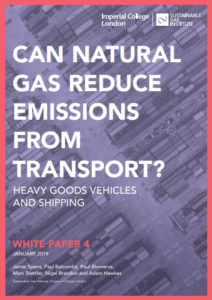The Imperial College London published a report examining the use of natural gas for shipping. It says that using natural gas fuel with other methods could help the shipping industry meet environmental targets, but it should be combined with energy efficiency measures.
The paper, written by academics at Imperial’s Sustainable Gas Institute, examines the benefits of using natural gas for ship fuel. It also looks at how the change could affect GHG emissions, air pollution, and cost to industry.
[smlsubform prepend=”GET THE SAFETY4SEA IN YOUR INBOX!” showname=false emailtxt=”” emailholder=”Enter your email address” showsubmit=true submittxt=”Submit” jsthanks=false thankyou=”Thank you for subscribing to our mailing list”]
Namely, natural gas to fuel ships releases less carbon than diesel. However, some natural gases, like methane, leak as they move through the supply chain. This reduces the benefit of switching fuel. Thus, natural gas should be combined with energy efficiency measures that will significantly improve greenhouse gas emissions.
In fact, the authors noted that switching to natural gas as a transport fuel could provide cost effective emissions benefit and the technology is available, but it will not be enough to reach long term low carbon ambitions.
Lead author Dr. Jamie Speirs, from Imperial’s Department of Earth Science & Engineering, explained:
The greenhouse gas benefits of natural gas as a transport fuel are useful in the short term, but must be coupled with additional energy efficiency measures and longer term plans that include much lower carbon truck and ship technologies
Moreover, ships that use natural gas are expensive to make, but the authors believe that the money saved in fuel will outweigh the initial cost over their lifetime as natural gas is currently cheaper than diesel.
Shipping manufacturers can also reduce the amount of energy, and money, used by installing solar panels to supplement energy needs and using sails to leverage wind power. Another method would be to use barnacle-repellent paint to avoid build up on the hull and keep the ship streamlined.
Finally, the report states that small amounts of methane leakage across the supply chain of natural gas can eliminate the benefit of substituting diesel for natural gas.
See more information in the PDF below































































